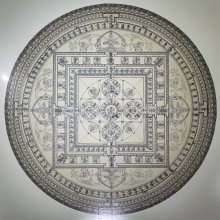Jayakara, Jayākara, Jaya-kara: 9 definitions
Introduction:
Jayakara means something in Buddhism, Pali, Hinduism, Sanskrit, Hindi. If you want to know the exact meaning, history, etymology or English translation of this term then check out the descriptions on this page. Add your comment or reference to a book if you want to contribute to this summary article.
Alternative spellings of this word include Jaykar.
Images (photo gallery)
In Hinduism
Ayurveda (science of life)
Veterinary Medicine (The study and treatment of Animals)
Source: archive.org: The Elephant Lore of the HindusJayakara (जयकर) refers to “those elephants who are bringers of victory”, according to the 15th century Mātaṅgalīlā composed by Nīlakaṇṭha in 263 Sanskrit verses, dealing with elephantology in ancient India, focusing on the science of management and treatment of elephants.—[Cf. chapter 1, “on the origin of elephants”]: “[...] 40. Of all creatures the springtime is declared to produce must (intoxication, exhilaration), but particularly of elephants. Therefore those who are born in spring are scent elephants. And from the smell of their sweat, dung, urine, and must-fluid other elephants instantly are excited (made must). These scent elephants are bringers of victory (jayakara) to kings”.

Āyurveda (आयुर्वेद, ayurveda) is a branch of Indian science dealing with medicine, herbalism, taxology, anatomy, surgery, alchemy and related topics. Traditional practice of Āyurveda in ancient India dates back to at least the first millenium BC. Literature is commonly written in Sanskrit using various poetic metres.
In Buddhism
Tibetan Buddhism (Vajrayana or tantric Buddhism)
Source: archive.org: The Indian Buddhist IconographyJayakara (जयकर) refers to one of the four Balabhadra deities, commonly depicted in Buddhist Iconography, and mentioned in the 11th-century Niṣpannayogāvalī of Mahāpaṇḍita Abhayākara.—His Colour is white; his Symbol is the garland; his Vehicle is the cuckoo chariot.
Jayakara is described in the Niṣpannayogāvalī (dharmadhātuvāgīśvara-maṇḍala) as follows:—
“Jayakara rides a chariot drawn by cuckoos; he is (white in colour) and is four-armed. With the two right hands he carries the garland of flowers and the arrow and with the two left caṣaka (wine-glass) and the bow”.

Tibetan Buddhism includes schools such as Nyingma, Kadampa, Kagyu and Gelug. Their primary canon of literature is divided in two broad categories: The Kangyur, which consists of Buddha’s words, and the Tengyur, which includes commentaries from various sources. Esotericism and tantra techniques (vajrayāna) are collected indepently.
Languages of India and abroad
Sanskrit dictionary
Source: Cologne Digital Sanskrit Dictionaries: Monier-Williams Sanskrit-English DictionaryJayākara (जयाकर):—[from jaya] m. ‘mine of victory’, Name of a man, [vii, 125].
Source: DDSA: Paia-sadda-mahannavo; a comprehensive Prakrit Hindi dictionary (S)Jayakāra (जयकार) in the Sanskrit language is related to the Prakrit words: Jaakkāra, Jekkāra.
[Sanskrit to German]
Sanskrit, also spelled संस्कृतम् (saṃskṛtam), is an ancient language of India commonly seen as the grandmother of the Indo-European language family (even English!). Closely allied with Prakrit and Pali, Sanskrit is more exhaustive in both grammar and terms and has the most extensive collection of literature in the world, greatly surpassing its sister-languages Greek and Latin.
Hindi dictionary
Source: DDSA: A practical Hindi-English dictionaryJayakāra (जयकार) [Also spelled jaykar]:—(nm) applause, applausive shouts, cheers hailing victory.
...
Kannada-English dictionary
Source: Alar: Kannada-English corpusJayakāra (ಜಯಕಾರ):—
1) [noun] a victory cry.
2) [noun] a cry welcoming, greeting or paying tribute to, a person; hail.
Kannada is a Dravidian language (as opposed to the Indo-European language family) mainly spoken in the southwestern region of India.
Nepali dictionary
Source: unoes: Nepali-English DictionaryJayakāra (जयकार):—n. 1. shout of victory; 2. praise; prayer;
Nepali is the primary language of the Nepalese people counting almost 20 million native speakers. The country of Nepal is situated in the Himalaya mountain range to the north of India.
See also (Relevant definitions)
Partial matches: Kaara, Kara, Jaya.
Starts with: Jayakaraka, Jayakarana.
Query error!
Full-text: Jaakkara, Jekkara, Jayakaar, Jaykar, Balabhadra, Paramashva.
Relevant text
Search found 4 books and stories containing Jayakara, Jaya-kara, Jayākara, Jayakāra; (plurals include: Jayakaras, karas, Jayākaras, Jayakāras). You can also click to the full overview containing English textual excerpts. Below are direct links for the most relevant articles:
Notices of Sanskrit Manuscripts (by Rajendralala Mitra)
Page 87 < [Volume 14 (1904)]
Chaitanya Bhagavata (by Bhumipati Dāsa)
Verse 2.9.33 < [Chapter 9 - The Lord’s Twenty-One Hour Ecstasy and Descriptions of Śrīdhara and Other Devotees’ Characteristics]
Verse 3.4.192 < [Chapter 4 - Descriptions of Śrī Acyutānanda’s Pastimes and the Worship of Śrī Mādhavendra]
Verse 2.1.129 < [Chapter 1 - The Beginning of the Lord’s Manifestation and His Instructions on Kṛṣṇa-saṅkīrtana]
World Journal of Pharmaceutical Research
Role of Abhrak Bhasma as a Rasayan with anti-aging benefits. < [2020: Volume 9, July issue 7]
Blue Annals (deb-ther sngon-po) (by George N. Roerich)
Chapter 5 - Keepers of Vinaya < [Book 2 - Later spread of the Doctrine]
